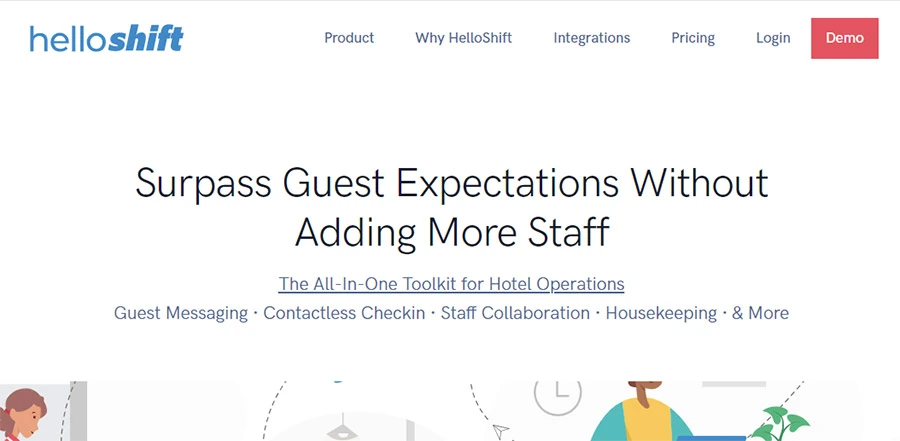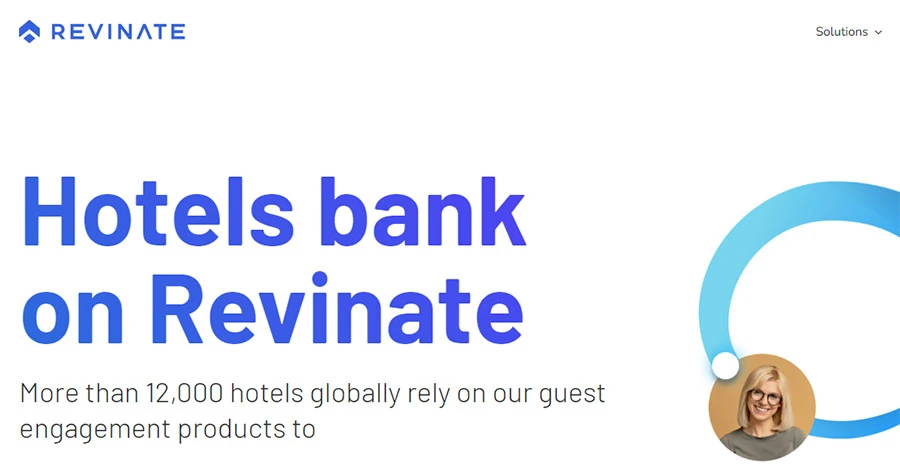Guest communication is the cornerstone of delivering a great hotel experience. How you interact with guests, from booking to departure, impacts their satisfaction, loyalty, and reviews.
This guide will walk you through essential tips and strategies for effective communication. You’ll learn how to build strong relationships, solve issues swiftly, and enhance the overall guest experience.
Whether through personalised messages, timely responses, or thoughtful gestures, we’ll cover everything you need to know to keep your guests happy and returning. Let’s get started!
What is Hotel Guest Communication?
Hotel guest communication refers to every interaction you have with guests, from the moment they book to after they check out. It includes face-to-face conversations, phone calls, emails, and digital exchanges like chat or social media.
Effective guest communication ensures that guests feel welcome, valued, and understood at all times. It’s about being clear, responsive, and proactive, addressing guest needs and concerns to enhance their stay and create positive experiences that lead to repeat bookings and great reviews
The Role of Communication in Guest Experience
Communication shapes the entire guest experience. From setting expectations before arrival to addressing needs during their stay, every interaction plays a crucial role.
How you communicate directly impacts guests’ perceptions of your hotel. It influences their comfort, trust, and overall satisfaction, which are key factors in guest loyalty.
By building rapport, swiftly resolving issues, and personalising the experience, you can make each guest feel valued. Maintaining clear, timely communication across all touchpoints not only enhances satisfaction but also increases the chances of positive reviews and repeat bookings.
Companies that prioritise customer experience often see 4-8% higher revenue growth compared to competitors. This shows the tangible benefits of effective communication.
Types of Guest Communication

Hotels use various methods to interact with guests, each serving a unique purpose in the guest journey.
Face-to-Face Communication
This includes conversations at check-in, concierge services, and in-person problem resolution. It’s key to building immediate rapport.
Digital Communication
Emails, SMS, and messaging apps allow hotels to engage with guests before, during, and after their stay. This keeps information flowing smoothly and promptly.
AI-Powered Tools
Chatbots and automated responses provide 24/7 communication, allowing guests to resolve common issues or requests instantly, even outside working hours.
Each of these methods plays a vital role in ensuring smooth communication and an excellent guest experience.
How to Communicate Effectively with Guests
Personalise Communication
Tailor interactions based on guest preferences. Use guest names and offer relevant recommendations, such as restaurant tips or local events, based on their stay. Personalisation makes guests feel valued and remembered.
Be Clear and Transparent
Provide detailed information about bookings, policies, amenities, and any associated costs. Avoid hidden fees by clearly outlining all charges upfront, including taxes, service fees, and additional charges. This transparent communication helps prevent misunderstandings and ensures guests are fully informed throughout their stay. When guests know exactly what to expect, it builds trust and reduces the likelihood of complaints.
Respond Quickly
Timely replies show guests that their time is valued. Nearly 70% of customers expect a response within 24 hours, while 39% expect one within just 2 hours. To meet these expectations, use chatbots to handle FAQs and automate common enquiries, reserving human touchpoints for more complex issues.
Quick, efficient responses help prevent concerns from escalating and demonstrate that guest satisfaction is a priority.
Active Listening
Research shows that 56% of consumers base their satisfaction on feeling understood and that their personal needs are met. This highlights the importance of active listening in guest communication.
Active listening involves more than hearing—it’s about asking clarifying questions to fully grasp the issue and reflecting concerns back to confirm understanding. By doing this, you demonstrate genuine empathy and care. When guests feel heard and understood, it builds trust, leading to higher satisfaction, positive reviews, and guest loyalty. Effective listening turns issues into opportunities to strengthen relationships.
Use Multiple Channels
Offer a range of communication channels such as in-person interactions, emails, phone calls, WhatsApp, and SMS. Providing options makes it easy for guests to reach you using their preferred method.
First-Time Resolution
Solve problems as soon as they arise to enhance guest satisfaction. Whether it’s a room issue or service request, resolving the problem on the first try builds trust and loyalty.
Maintain a Consistent Tone
Train staff to use a friendly, professional, and consistent tone across all platforms. Whether communicating in person, through email, or via chat, consistency reassures guests that they are in capable hands.
Proactive Communication
Anticipate guest needs by reaching out before they do. For example, check on how their stay is going midway through their visit or send an email with helpful information before they arrive.
Non-Verbal Communication

Non-verbal cues play a significant role in how guests perceive you and your hotel. These subtle gestures can set the tone for the entire interaction.
Start with a Smile
A genuine smile is a powerful way to make guests feel welcome and at ease. It helps build an immediate connection and sets a positive tone for the interaction.
Maintain Positive Body Language
Standing tall with an open posture, maintaining eye contact, and using appropriate hand gestures show attentiveness and confidence. Positive body language reinforces verbal communication and helps guests feel valued and understood.
Common Guest Communication Mistakes to Avoid
Delayed Responses
Guests expect timely replies. Slow communication frustrates guests and can lead to negative experiences or reviews. Always aim for prompt responses, especially in urgent situations.
Using a Negative or Dismissive Tone
How you say something is as important as what you say. Avoid sounding dismissive or uninterested, and instead, focus on being empathetic and supportive.
Lack of Personalisation
Sending generic messages can make guests feel like they’re just another booking. Personalise your communication to make them feel valued and special.
Inconsistent Messaging
Inconsistent information from different staff members or channels can confuse guests. Ensure all team members are on the same page and follow set communication guidelines.
Over-Communicating
Bombarding guests with too many messages can overwhelm and annoy them. Strike a balance by providing necessary information without overloading their inbox.
Ignoring Negative Reviews
Failing to address negative feedback can damage your hotel’s reputation. Always respond to reviews—both positive and negative—with genuine concern and a willingness to resolve issues.
Technology in Guest Communication
Technology plays a crucial role in modern guest communication, improving both efficiency and guest satisfaction.
AI and Chatbots

Automated systems like AI-powered chatbots allow hotels to provide 24/7 support. They handle common inquiries, such as check-in times or room availability, allowing staff to focus on more complex issues.
Tools available::
- Zendesk Answer Bot: An AI-driven chatbot that handles guest inquiries and common requests.
- HelloShift: Offers chatbots and live chat support for hotels, improving guest communication.
- Quicktext: Specialises in AI chatbots tailored for hotel websites and messaging platforms.
Centralised Communication Systems

Unified platforms help manage guest communication from multiple channels (email, social media, chat apps) in one place, ensuring no messages are missed.
Tools available:
- Whistle: Integrates messaging from multiple channels into one platform, streamlining guest communication.
- Zingle: Combines SMS, email, and messaging apps in a unified system for hotel teams.
- Guestline: Offers centralised communication tools alongside its property management system.
Personalisation Tools

Technology also enables personalised communication, sending tailored messages based on guest preferences and previous stays.
Tools available:
- Revinate: Allows hotels to send personalised emails and messages based on guest data.
- Guestfolio: A CRM tool focused on tailoring communication to individual guests.
- Salesforce Hospitality Cloud: Enables personalised marketing and messaging through guest data integration.
Make sure to clearly define your requirements, as some software solutions may offer all the features you need in one platform. This can help you avoid the complexity of using multiple systems and streamline your operations. Understanding your needs upfront will allow you to select a tool that simplifies your workflow and improves efficiency.
Handling Mistakes and Complaints
Mistakes and complaints are inevitable, but how you address them can transform a guest’s experience. In fact, 83% of customers report feeling more loyal to brands that effectively respond and resolve their complaints. Here are steps to take to handle mistakes and complaints:
1. Acknowledge the Issue Quickly
Respond promptly to any complaints and acknowledge the guest’s frustration. A simple apology can diffuse tension and show that you care.
2. Take Responsibility
Own the mistake, regardless of where it originated. This helps build trust and reassures the guest that their concerns are being taken seriously.
3. Offer Solutions
Provide multiple options to resolve the issue. Whether it’s a room upgrade, refund, or a complimentary service, giving guests the choice empowers them and helps restore their satisfaction.
By handling complaints professionally and with empathy, you can turn negative experiences into positive outcomes, maintaining guest loyalty.
Managing Reviews and Feedback
Managing guest reviews and feedback is essential for maintaining your hotel’s reputation and improving guest experiences.
Politely ask for feedback
Reviews are important to build trust with future guests, but there is a time and a place. Politely ask satisfied guests to leave reviews during check-out or via follow-up emails.
Respond to Reviews Promptly
Address both positive and negative reviews quickly. Acknowledge compliments and show appreciation, while apologising for any issues raised in negative reviews.
Stay Professional and Empathetic
For negative reviews, remain calm, take responsibility, and offer to resolve the issue offline. Show guests that their feedback matters.
Learn and Improve
Use feedback to identify areas of improvement and enhance your service. Regularly analyse reviews to spot trends and adapt accordingly.
Managing reviews effectively can turn feedback into opportunities for growth and guest loyalty.
Conclusion
Refining guest communication strategies is key to creating long-term guest satisfaction and loyalty. Personalised, timely, and empathetic interactions build trust and enhance guest experiences, making them more likely to return.
Utilising technology, like AI tools and centralised systems, helps streamline communication and ensures guests feel valued at every stage of their stay.
By continuously improving how you communicate, you not only resolve issues quickly but also foster deeper connections with your guests. This focus on communication leads to stronger loyalty and long-term success for your hotel.

